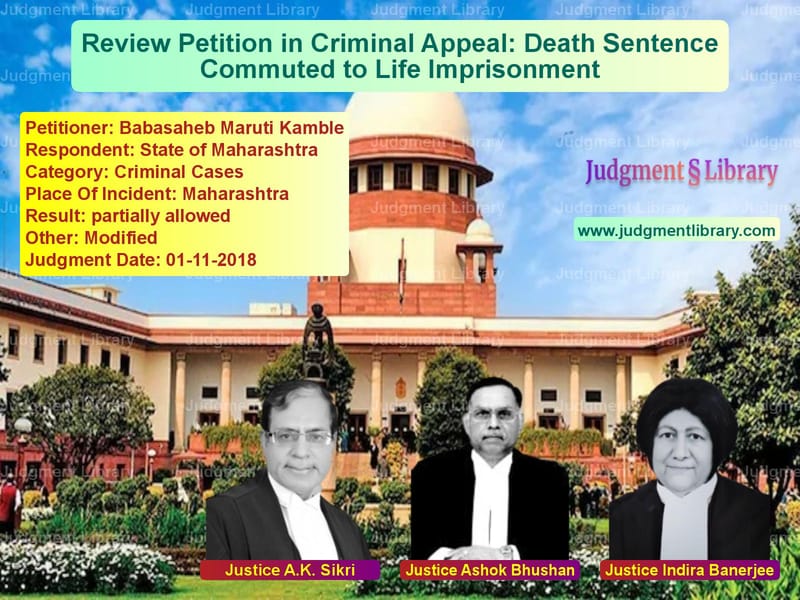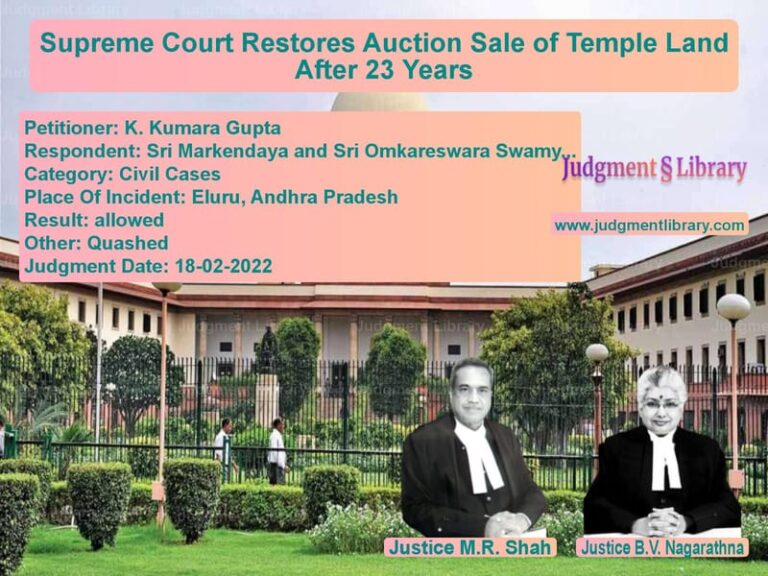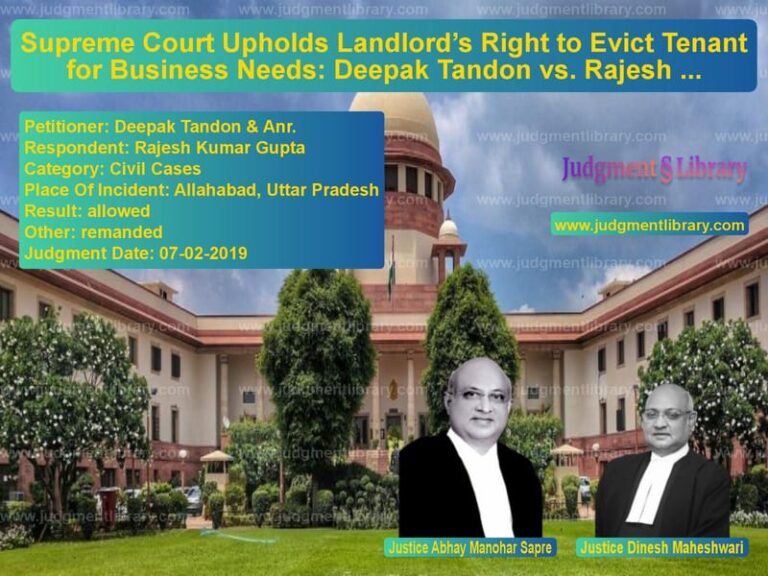Review Petition in Criminal Appeal: Death Sentence Commuted to Life Imprisonment
The case of Babasaheb Maruti Kamble vs. State of Maharashtra is a significant legal battle that underscores the crucial jurisprudence concerning death penalty cases in India. The petitioner was convicted and sentenced to death for an offence under Section 302 of the Indian Penal Code (IPC), alongside life imprisonment under Section 376(2)(f), and two months of simple imprisonment under Section 342. The case was brought before the Supreme Court through a review petition following the High Court’s confirmation of the death sentence and the dismissal of the special leave petition.
Background of the Case:
The prosecution argued that the appellant was last seen with the victim, a minor girl, and that forensic evidence linked him to the crime. The trial court, after examining the evidence, sentenced the appellant to death, holding that the case fell under the “rarest of rare” category. The High Court upheld the trial court’s findings and confirmed the sentence, leading to the dismissal of the appellant’s special leave petition.
Petitioner’s Arguments:
The petitioner, through his counsel, argued that the dismissal of the special leave petition in a capital punishment case was unjust. Citing Mohammed Ajmal Mohammad Amir Kasab vs. State of Maharashtra, he contended that the Supreme Court must independently review all evidence when the death penalty is imposed. The petitioner also emphasized mitigating factors such as his socio-economic background, lack of prior criminal record, and the possibility of reformation.
Respondent’s Arguments:
The State of Maharashtra argued that the conviction was based on compelling circumstantial evidence. The prosecution cited the last seen theory, forensic reports linking the appellant to the crime, and the recovery of incriminating articles from his residence. The State asserted that the High Court had meticulously examined the evidence and found no reason to interfere with the trial court’s decision.
Judicial Analysis:
The Supreme Court acknowledged the gravity of the offence but emphasized that a death sentence must meet the criteria established in Bachan Singh vs. State of Punjab. The Court observed that while the crime was heinous, the mitigating circumstances warranted reconsideration. The Court referred to Shatrughan Chauhan vs. Union of India, which held that undue delay in execution and lack of judicial review at every stage could be grounds for commuting a death sentence.
Judgment:
The Supreme Court, after a thorough review, commuted the death sentence to life imprisonment with a condition that the appellant must serve at least 20 years before becoming eligible for remission. The sentences under Sections 376(2)(f) and 342 were upheld, and all sentences were ordered to run concurrently.
This judgment reaffirms the principle that the death penalty should be imposed sparingly and only in cases where the convict poses a continuing threat to society. It also underscores the judiciary’s duty to ensure due process in capital punishment cases.
The Supreme Court, in its analysis, referred to multiple precedents that have guided the application of the death penalty, including Macchi Singh vs. State of Punjab. The Court stated that for a crime to fall under the “rarest of rare” category, it must shock the conscience of society and leave no room for rehabilitation of the accused.
Significance of the Judgment:
- The judgment highlights the evolving jurisprudence on capital punishment.
- It underscores the necessity for meticulous judicial review in death penalty cases.
- It reaffirms the Supreme Court’s role in ensuring that sentencing is proportionate to the crime.
In conclusion, this judgment serves as an essential precedent in Indian criminal law, emphasizing that even in cases of grave offences, the courts must weigh both aggravating and mitigating factors before confirming a death sentence. The decision is a landmark in reiterating that life imprisonment, rather than the death penalty, should be the norm unless the case meets the strictest criteria for capital punishment.
Petitioner Name: Babasaheb Maruti Kamble.Respondent Name: State of Maharashtra.Judgment By: Justice A.K. Sikri, Justice Ashok Bhushan, Justice Indira Banerjee.Place Of Incident: Maharashtra.Judgment Date: 01-11-2018.
Don’t miss out on the full details! Download the complete judgment in PDF format below and gain valuable insights instantly!
Download Judgment: Babasaheb Maruti Kam vs State of Maharashtra Supreme Court of India Judgment Dated 01-11-2018.pdf
Direct Downlaod Judgment: Direct downlaod this Judgment
See all petitions in Bail and Anticipatory Bail
See all petitions in Attempt to Murder Cases
See all petitions in Custodial Deaths and Police Misconduct
See all petitions in Judgment by A.K. Sikri
See all petitions in Judgment by Ashok Bhushan
See all petitions in Judgment by Indira Banerjee
See all petitions in partially allowed
See all petitions in Modified
See all petitions in supreme court of India judgments November 2018
See all petitions in 2018 judgments
See all posts in Criminal Cases Category
See all allowed petitions in Criminal Cases Category
See all Dismissed petitions in Criminal Cases Category
See all partially allowed petitions in Criminal Cases Category







